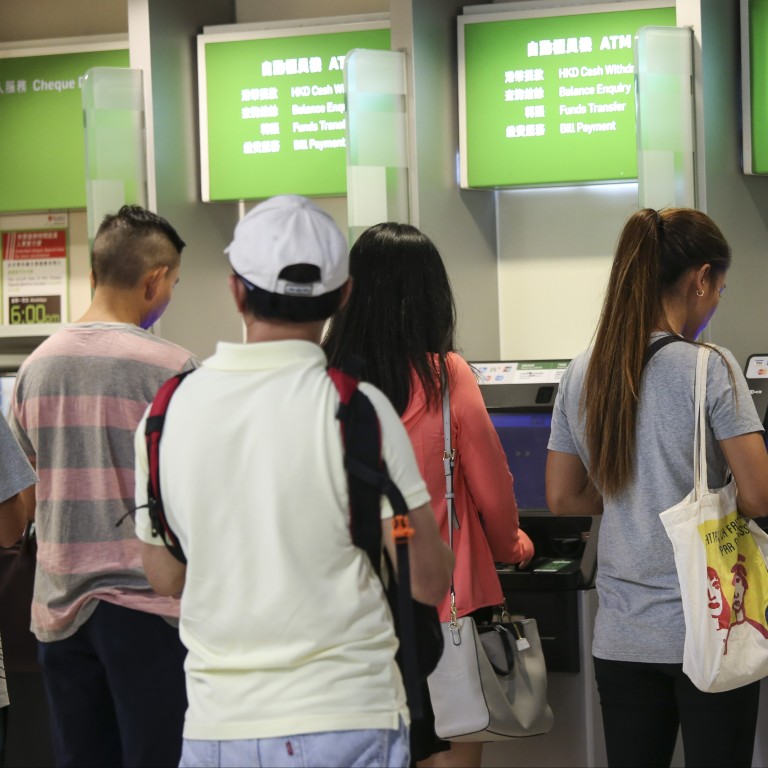
Hong Kong’s Exchange Fund posts 55 per cent drop third quarter income amid stock slump, political turmoil
- Income from investment in bonds, as well as holdings in local and foreign equities, worsens in the latest quarter
- Hong Kong government gets HK$7.3 billion in third quarter for placing its fiscal reserves with the Fund
Hong Kong's Exchange Fund, the war chest used to defend the local currency from attacks by short sellers, has reported a 55 per cent drop in third quarter income, hurt by a stock market slump amid the city’s worst political crisis.
Investment income fell to HK$20.2 billion (US$2.58 billion) from HK$45 billion in the April-June quarter, according to a report submitted by the Hong Kong Monetary Authority to a panel in the Legislative Council on Monday. The income compares with HK$9.5 billion from a year earlier.
Losses from the Fund’s bets on Hong Kong equities widened to HK$12.3 billion in the latest quarter from HK$500 million in the second quarter, showing the full brunt of anti-government protests on its holdings and the broader stock market. The benchmark Hang Seng Index fell 8.6 per cent in that time, the worst in four years.
The performance reflects the challenges facing HKMA’s Chief Executive Eddie Yue Wai-man in bolstering the war chest to support its 36-year old peg to the US dollar in a weakening economy. A government report last week confirmed the city has slipped into a technical recession last quarter, as five months of street protests hurt everything from retail sales to tourism and home prices.
Retail sales drop 18.3 per cent in September as ongoing protests and trade war batter sentiment
Other parts of the Fund’s investments have also suffered. Its holdings in foreign equities declined by 70 per cent to HK$4.6 billion from the second quarter, today’s report shows. The MSCI World Index of global stocks was little changed, after rallying 3.4 per cent in the second quarter, as the lingering US-China trade war heightened concerns about a global recession.
The Exchange Fund’s investment in bonds generated HK$29.9 billion of gain, which is 25 per cent lower than the preceding three months. Foreign-exchange loss narrowed to HK$2 billion from HK$17 billion in the second quarter, reflecting the currency translation impact on its holdings of foreign assets.
Based on the Fund’s 2018 annual report, it invested 70 per cent of its assets in debt securities, 11 per cent in foreign equities, 7 per cent in overseas properties and infrastructure projects, and 4 per cent in Hong Kong stocks. The balance was held in cash deposits.
Hong Kong’s dollar marks 36th peg anniversary with little fuss
Lawmakers including James To have expressed concerns if the street protests since June would lead to a massive capital outflows to rival cities such as Singapore, and erode Hong Kong’s premier position as an international financial centre. Yue, who took over the helm at the HKMA on October 1 from Norman Chan Tak-lam, is trying to allay those worries and the local currency peg.
“The social unrest over the past few months have seen a lot of rumour about the financial market of Hong Kong,” he told lawmakers on Monday. “I want to emphasise that there is no need, no plan to change the linked exchange rate system which has served Hong Kong well for decades. There will be no capital control as according to the Basic Law.”
Hong Kong’s currency peg isn’t an Achilles’ heel – it’s an Achilles’ shield
Despite of the social unrest, Hong Kong remain an attractive place for mainland and international investors to invest in its wealth management and other investment products, Yue said. Hong Kong remains an important gateway for foreign investment in and out of China, he added.
The Hong Kong government will receive HK$7.3 billion in the third quarter from the Fund, bringing the total for the nine months this year to HK$22.6 billion. The treasury places its fiscal reserve with the Exchange Fund as part of its assets, and earns a share of profit or loss from its investments.
The Exchange Fund was established in 1935 to back the issuance of banknotes and later mandated to invest the government’s official reserves. Yue, then as deputy chief executive in 2009, helped the Fund diversify into alternative assets such as private equity, property and infrastructure projects to augment returns from stocks and bonds. The alternative investment portfolio had an annualised internal rate of return of 13 per cent between its set up in 2009 and 2017.
“The HKMA has already kept 70 per cent of Exchange Fund assets in bonds, which is reasonably conservative. The fund, however, still reported a 55 per cent decline in its quarterly investment income due to stock investment loss. It may need to ask its external fund managers to review their stock picks in its Hong Kong and overseas stock portfolios,” said Kenny Ng Lai-yin, securities strategist at Everbright Sun Hung Kai.
“The Exchange Fund investment returns should be able to bounce back during the fourth quarter, as the stock market sentiment has turned better in October. The trade tensions between China and US have also eased recently. Both the US and Hong Kong have cut their interest rates in recent months and that will help support the stock market in Hong Kong as well as overseas. Next year is election year in the US, and President Donald Trump will have more policies to support the stock market,” Ng said.

